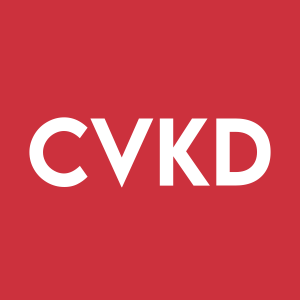Cadrenal Therapeutics Highlights Publication of Peer-Reviewed Article Supporting Need for New Anticoagulation Therapy for Patients with Certain Medical Conditions
Consistent with the evolving evidence documenting the need for VKA-based anticoagulant therapy, while simultaneously recognizing the deficiencies of the available VKA anticoagulants (such as warfarin), this latest peer-reviewed journal publication highlights:
- For most patients, DOACs are preferred over existing Vitamin K Antagonists [warfarin] for stroke prevention in atrial fibrillation (AFib) and venous thromboembolism treatment.
- However, randomized controlled trials indicate that DOACs may not be as efficacious or as safe in conditions such as mechanical heart valves, thrombotic antiphospholipid syndrome (APS), and AFib associated with end-stage kidney disease (ESKD).
- Their [DOACs] efficacy is uncertain for conditions such as left ventricular thrombus, and for patients with AFib or venous thrombosis who have ESKD.
"This expert review provides an assessment of the available evidence regarding DOACs, detailing not only when they have demonstrated efficacy and safety, but also when the DOACs have failed and therefore should not be the standard of care," commented Quang Pham, Founder, Chairman and Chief Executive Officer of Cadrenal Therapeutics. "These critical gaps in anticoagulation therapy, such as for patients with left ventricular assist devices (LVADs), thrombotic APS, and those with AFib and ESKD, highlight and support the need for the advancement of our tecarfarin development program to serve these patients."
Further information on the article is available at https://www.jacc.org/doi/epdf/10.1016/j.jacc.2023.10.038.
ABOUT CADRENAL THERAPEUTICS, INC.
Cadrenal Therapeutics is developing tecarfarin for unmet needs in anticoagulation therapy. Tecarfarin is a late-stage novel oral and reversible anticoagulant (blood thinner) to prevent heart attacks, strokes, and deaths due to blood clots in patients with certain medical conditions. Tecarfarin has orphan drug and fast track designations from the FDA for the prevention of systemic thromboembolism (blood clots) of cardiac origin in patients with end-stage kidney disease (ESKD) and atrial fibrillation (AFib). Cadrenal is also pursuing additional regulatory strategies for unmet needs in anticoagulation therapy for patients with left ventricular assist devices (LVADs) and those with thrombotic antiphospholipid syndrome (APS). Tecarfarin is specifically designed to leverage a different metabolism pathway than the oldest and most commonly prescribed Vitamin K Antagonist (warfarin). Tecarfarin has been evaluated in eleven (11) human clinical trials and more than 1,000 individuals. In Phase 1, Phase 2, and Phase 2/3 clinical trials, tecarfarin has generally been well-tolerated in both healthy adult subjects and patients with chronic kidney disease. For more information, please visit: www.cadrenal.com.
Safe Harbor Statement
Any statements contained in this press release about future expectations, plans, and prospects, as well as any other statements regarding matters that are not historical facts, may constitute "forward-looking statements." These statements include statements regarding the critical gaps in anticoagulation therapy, such as for patients with left ventricular assist devices (LVADs), thrombotic APS, and those with AFib and ESKD, highlighting and supporting the need for the advancement of our tecarfarin development program to serve these patients.The words "anticipate," "believe," "continue," "could," "estimate," "expect," "intend," "may," "plan," "potential," "predict," "project," "should," "target," "will," "would" and similar expressions are intended to identify forward-looking statements, although not all forward-looking statements contain these identifying words. Actual results may differ materially from those indicated by such forward-looking statements as a result of various important factors, including the ability to advance tecarfarin with patients with left ventricular assist devices (LVADs), thrombotic APS, and those with AFib and ESKD and the other risk factors described in the Company's Annual Report on Form 10-K for the year ended December 31, 2022, and the Company's subsequent filings with the SEC, including subsequent periodic reports on Quarterly Reports on Form 10-Q and Current Reports on Form 8-K. Any forward-looking statements contained in this press release speak only as of the date hereof and, except as required by federal securities laws, the Company specifically disclaims any obligation to update any forward-looking statement, whether as a result of new information, future events, or otherwise.
For more information, please contact:
Cadrenal Therapeutics:
Matthew Szot, CFO
858-337-0766
press@cadrenal.com
Investors:
Lytham Partners, LLC
Robert Blum, Managing Partner
602-889-9700
CVKD@lythampartners.com
![]() View original content to download multimedia:https://www.prnewswire.com/news-releases/cadrenal-therapeutics-highlights-publication-of-peer-reviewed-article-supporting-need-for-new-anticoagulation-therapy-for-patients-with-certain-medical-conditions-302048797.html
View original content to download multimedia:https://www.prnewswire.com/news-releases/cadrenal-therapeutics-highlights-publication-of-peer-reviewed-article-supporting-need-for-new-anticoagulation-therapy-for-patients-with-certain-medical-conditions-302048797.html
SOURCE Cadrenal Therapeutics, Inc.








